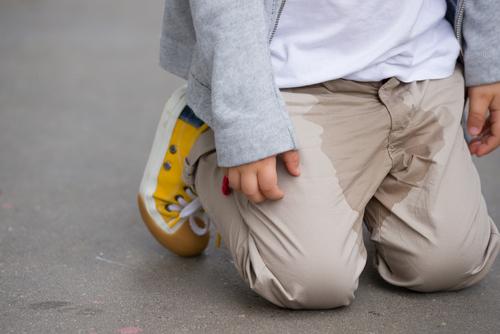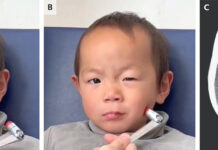A 14-year-old, otherwise healthy, boy was having difficulty managing his time at school. Every time he would laugh, he would wet his pants. His symptoms were interfering with his social and school life
A 14-year-old boy presented to the outpatient department with a concern that every time he laughed, he wet his pants. The patient elaborated that every giggle would lead to total bladder emptying, irrespective of where he was.
The patient had urinary incontinence for many years, but it had worsened recently. At the time of presentation, he was having at least 3 episodes of incontinence in a week. However, he would wet his pants only by laughing. No such complaint was associated with coughing, sneezing, or running.
Consequently, he was feeling more anxious. He was constantly stressed regarding any episode at school. This had affected his social life at school. Moreover, he was more conscious during extracurricular activities (i.e., hockey and baseball) too. Ultimately, he had started avoiding school and sports activities.
He had unremarkable past medical, surgical, and medication histories. His mother had potty-trained him without any difficulty at an earlier age. When he was 3-4 years old, he had constipation. However, after that, he never had a similar experience.
The patient had no polydipsia, no polyuria, and no nocturnal enuresis.
On examination, he was a teenager with average height and built. He appeared well. Abdominal examination revealed a soft, non-tender abdomen, with no masses and or organomegaly. His bladder was not palpable.
Moreover, the examination of genitalia was normal. He had an uncircumcised penis, an easily retractable foreskin, and a normal urethral orifice. His pubertal development was appropriate at Tanner stage 3.
Serological parameters were normal. The patient had a normal urinalysis result. His serum glucose reading was 5.7 mmol/L.
His physician recommended Kegel exercises and bladder training/timed voiding.
Two months later he presented with no improvement of symptoms.
Then a pediatric urologist came on board. He made a diagnosis of giggle incontinence (GI). Therefore, he started the boy on 10 mg of oral methylphenidate (MPH) twice a day.
Methylphenidate is a drug that is usually given to patients with attention deficit hyperactivity disorder. The pharmacist counselled the patient to take the first MPH tablet before school followed by another dose 5 hours later to ensure coverage near the end of the school day.
Moreover, the doctor told the patient to skip taking Methylphenidate on weekends. They also discussed benefits and side effects including mood, sleep, and appetite changes.
At the 9-month follow-up, the mother revealed that the boy had considerable improvement with no side effects.
The mother revealed that her aunt and her mother had similar symptoms too and they both outgrew the symptoms. She strongly believed her son’s symptoms were either related to a growth spurt or due to the intense extracurricular activities near the end of the school term. The boy discontinued MPH. However, there were no follow-ups for similar complaint thereafter.




